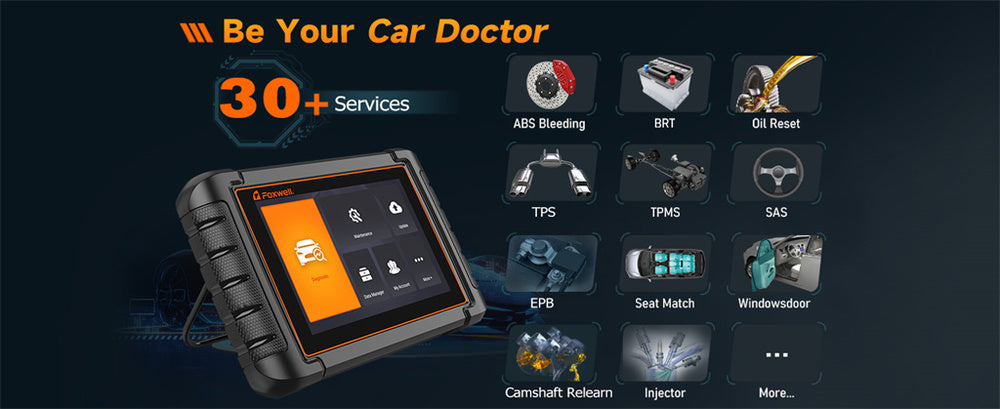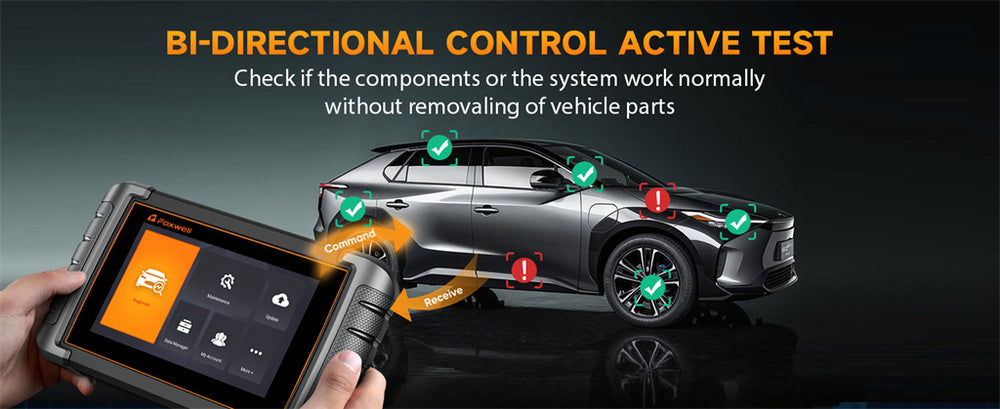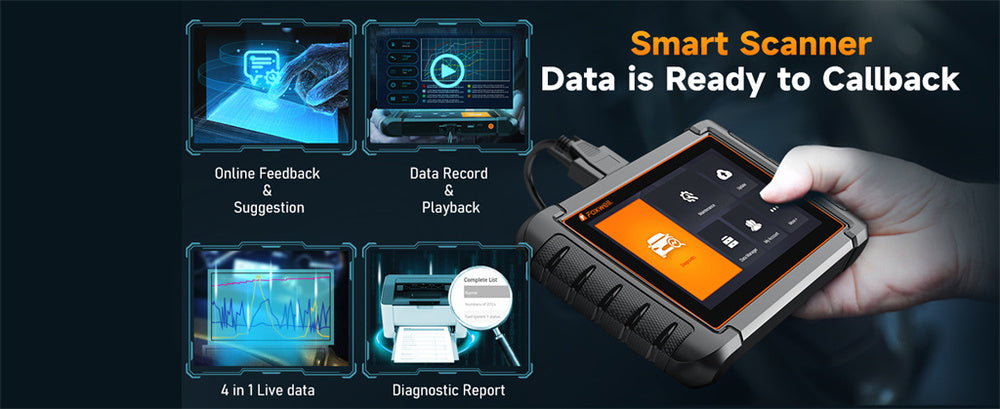You're on a road trip with your family, enjoying the scenic views and the open road. Suddenly, your car's check engine light comes on, causing a wave of anxiety. What could be wrong? Is it safe to continue driving?
Do you need to find the nearest mechanic immediately? This uncertainty can quickly turn an enjoyable trip into a stressful experience.
This is where car health scanners with live data tracking come into play. With one of these devices, you can instantly diagnose the issue right from your driver's seat. These scanners connect to your car's onboard diagnostics system, providing real-time data and insights into your vehicle's health.
No more guessing games—just clear, actionable information that helps you make informed decisions.
The importance of such technology is underscored by recent market research. According to a report by MarketsandMarkets, the global automotive diagnostic scan tools market is projected to grow from USD 41.4 billion in 2021 to USD 62.6 billion by 2026, at a compound annual growth rate (CAGR) of 8.6%. This growth is driven by the increasing complexity of modern vehicles and the need for more sophisticated diagnostic tools.
Understanding Car Health Scanners

Car health scanners, also known as car diagnostic scanner, are devices that connect to your vehicle's onboard diagnostics system. They retrieve and display data about various aspects of your car's performance and health.
The "live data tracking" feature allows users to monitor real-time data, providing immediate feedback on the vehicle's condition. These scanners have evolved significantly over time, becoming more user-friendly and feature-rich.
Originally, diagnostic tools were available only to professional mechanics and required specialized knowledge to operate. Today, however, even basic models offer comprehensive data that can be easily understood by car owners, making vehicle diagnostics accessible to everyone.
How Car Health Scanners Work
Car health scanners, also known as OBD-II scanners, are sophisticated devices that interface with your vehicle's onboard diagnostics system to monitor and report on various aspects of your car's health. Here’s a detailed look at how these scanners ,such as Foxwell OBD2 Scanner operate:
Connection:
- OBD-II Port: The scanner connects to the OBD-II port, a standardized diagnostic interface found in all cars manufactured after 1996. This port is typically located under the dashboard, near the driver's seat.
- Wireless Options: Modern scanners often offer Bluetooth or Wi-Fi connectivity, allowing them to pair with smartphones, tablets, or laptops for greater flexibility and ease of use.
Data Retrieval:
- ECU Communication: Once connected, the scanner communicates with the vehicle’s electronic control unit (ECU), which monitors and controls various engine and vehicle functions.
- Diagnostic Trouble Codes (DTCs): The scanner retrieves DTCs stored in the ECU. These codes are generated when the vehicle detects an issue within its systems, such as the engine, transmission, or emissions controls.
Display and Interpretation:
- Code Translation: The scanner translates the alphanumeric DTCs into readable descriptions. For instance, a code like P0300 might indicate a random/multiple cylinder misfire detected.
- Real-Time Data: Advanced scanners display real-time data from the vehicle’s sensors, including metrics such as engine RPM, fuel consumption, throttle position, and coolant temperature. This real-time data is invaluable for diagnosing issues as they occur.
Advanced Features:
- Live Data Streaming: Continuous monitoring of live data streams allows users to observe the vehicle's performance under various conditions.
- Graphical Display: Many scanners feature graphical displays of live data, helping users visualize trends and spot anomalies.
- Bi-Directional Control: Some high-end scanners offer bi-directional control, allowing users to perform active tests and send commands to the vehicle’s systems, such as initiating component tests or resetting certain functions.
Benefits of Using Car Health Scanners
The use of car health scanners with live data tracking offers numerous advantages for both professional mechanics and everyday car owners. Here are some detailed benefits:
Preventive Maintenance:
- Early Detection: By identifying issues early, car health scanners help prevent small problems from becoming major repairs. For example, detecting a minor exhaust leak early can prevent damage to the catalytic converter.
- Scheduled Maintenance: Scanners can remind users of scheduled maintenance tasks, ensuring that routine services like oil changes, brake pad replacements, and tire rotations are performed on time.
Cost Savings:
- DIY Diagnostics: Car health scanners empower car owners to diagnose issues themselves, reducing the need for costly visits to the mechanic. Knowing the exact problem can also prevent unnecessary repairs.
- Avoiding Overcharges: With a clear understanding of the vehicle’s issues, owners can avoid being overcharged for repairs. They can discuss the necessary fixes knowledgeably with their mechanic.
Enhanced Performance:
- Optimal Tuning: Real-time data allows users to monitor and fine-tune the vehicle’s performance. For example, adjusting driving habits based on fuel efficiency data can improve mileage.
- Performance Tracking: Continuous monitoring helps in tracking the performance of various components, ensuring they operate within optimal ranges.
User Empowerment:
- Knowledge and Control: Car health scanners provide users with detailed insights into their vehicle’s health, empowering them to make informed decisions about maintenance and repairs.
- Reduced Anxiety: Understanding the nature of a problem when the check engine light comes on can significantly reduce anxiety and help users decide on the best course of action.
Environmental Benefits:
- Emission Control: By monitoring and maintaining the vehicle’s emissions systems, car health scanners help reduce the vehicle’s environmental impact. Detecting and fixing issues like faulty oxygen sensors can ensure the car runs cleaner and more efficiently.
- Fuel Efficiency: Identifying and addressing problems that affect fuel efficiency can lead to lower fuel consumption, reducing the vehicle’s carbon footprint.
Tips for Using Car Health Scanners Effectively
To get the most out of your car health scanner, consider the following tips:
- Regular Checks: Use the scanner regularly to perform routine checks and ensure your car is in good condition. This can be especially useful before long trips.
- Data Interpretation: Familiarize yourself with the common diagnostic trouble codes and what they mean. Many scanners come with apps or manuals that help interpret the data.
- Follow-Up Actions: Based on the scanner’s feedback, take appropriate actions such as visiting a mechanic for more complex issues or performing minor fixes yourself. Knowing what to expect can save you time and money.
How to Use Car Health Scanners in Combination with Other Tools for Comprehensive Vehicle Diagnostics
Car health scanners with live data tracking are powerful tools, but their effectiveness can be greatly enhanced when used in conjunction with other diagnostic tools and features. Here's how you can leverage various tools together to ensure your vehicle stays in optimal condition.
- Using Car Health Scanners with Mobile Apps: Many modern car health scanners come with companion mobile apps that offer a range of additional features such as enhanced data visualization, diagnostic reports, and maintenance reminders.
- Integrating with Telematics Systems: Combine live data from the scanner with GPS tracking to monitor driving behavior and optimize routes for better fuel efficiency. Some telematics systems allow for remote diagnostics, meaning you can monitor your vehicle’s health even when you’re not in the car.
- Pairing with Other Diagnostic Tools: Use your car health scanner with multimeters, compression testers, and infrared thermometers for a thorough vehicle check-up. These tools help you measure voltage, check engine compression, and identify overheating issues.
- Utilizing Professional Diagnostic Software: Advanced diagnostic software can expand the capabilities of your car health scanner, allowing for detailed system analysis and advanced coding and programming.
- Regular Maintenance and Inspection: Incorporate scanner data into your regular maintenance routine. Perform visual inspections, and consult a mechanic when necessary. Use the data to have informed discussions with your mechanic, saving time and money on diagnostics.

Conclusion
By integrating your car health scanner with other tools and systems, you can achieve a comprehensive understanding of your vehicle’s health. This holistic approach ensures that you catch problems early, perform timely maintenance, and keep your car running smoothly.
Embrace these technologies to take control of your vehicle’s diagnostics and maintenance, ensuring a longer lifespan and better performance for your car.
FAQs
How do car health scanners work with mobile apps?
Car health scanners connect to mobile apps via Bluetooth or Wi-Fi, providing detailed data visualization, diagnostic reports, and maintenance reminders.
Can car health scanners detect all vehicle issues?
Car health scanners detect many engine, transmission, and emissions issues, but for comprehensive diagnostics, use them with other tools like multimeters.
How often should I use my car health scanner?
Use your car health scanner regularly, especially before long trips, to catch potential issues early and maintain your vehicle's condition.




Leave a comment
This site is protected by hCaptcha and the hCaptcha Privacy Policy and Terms of Service apply.